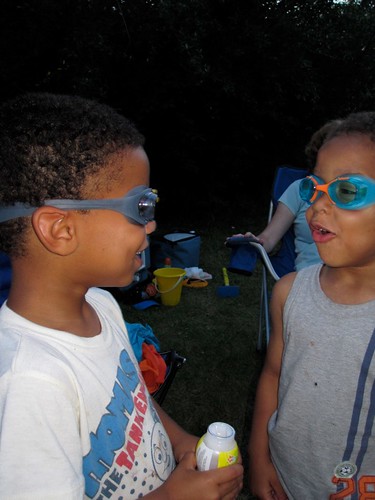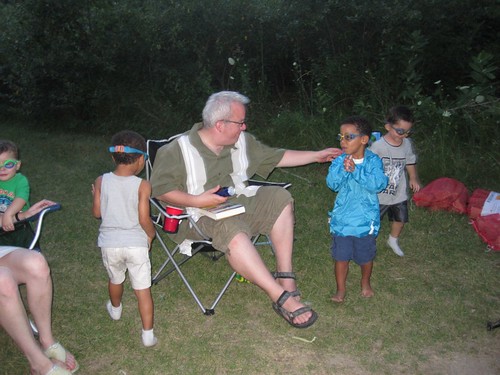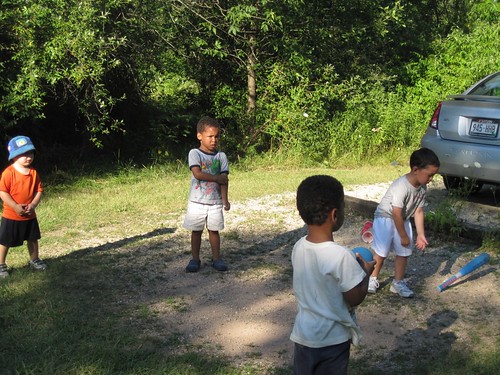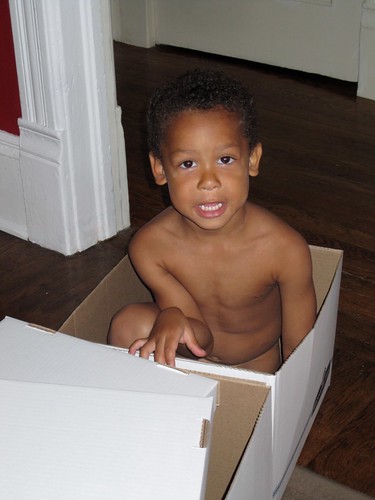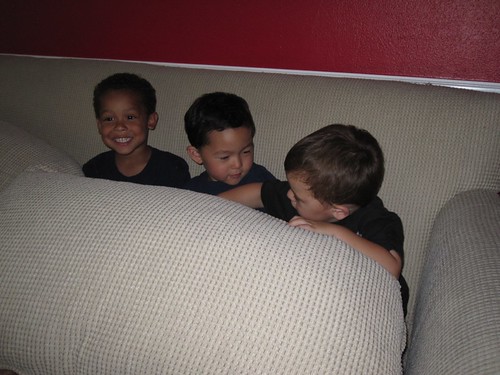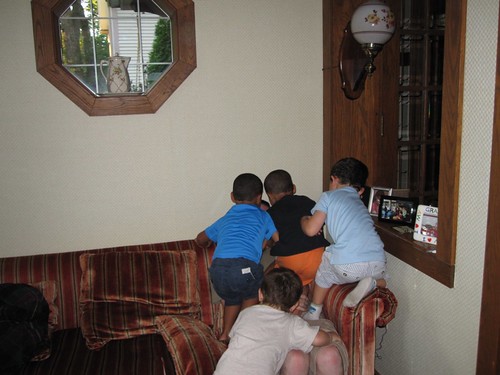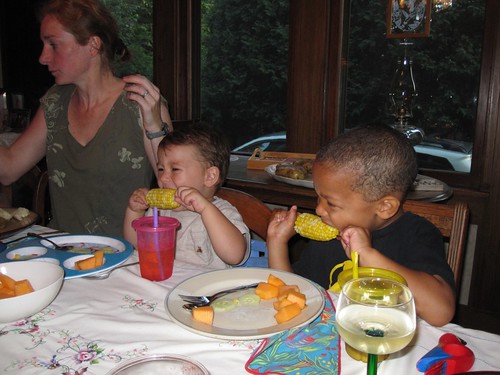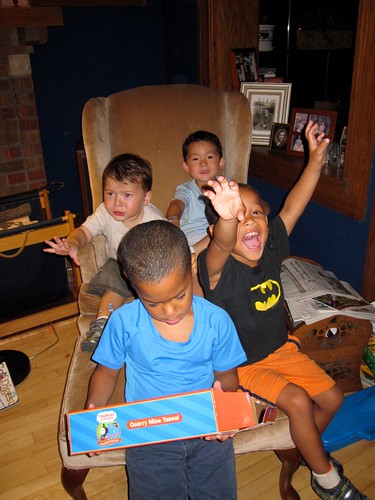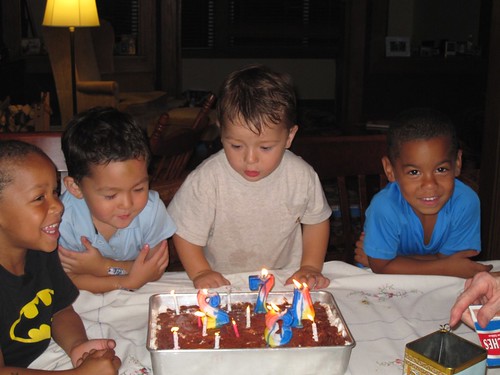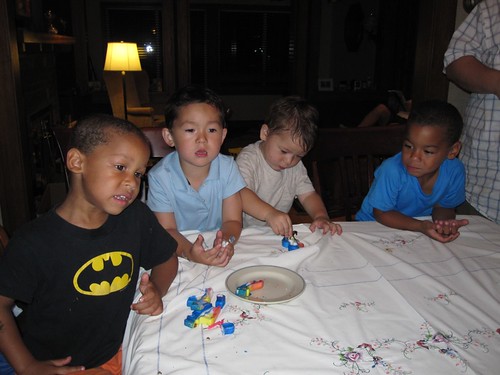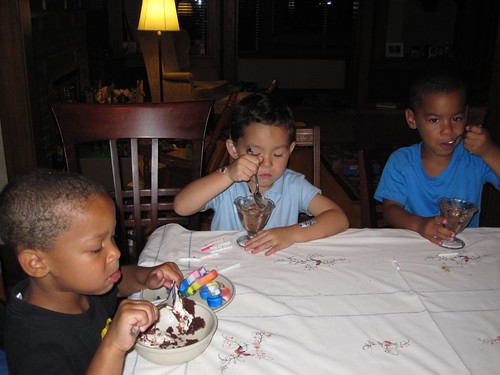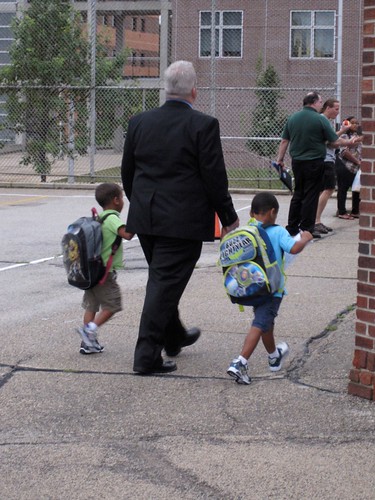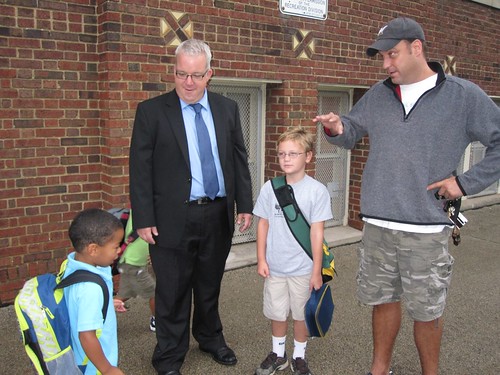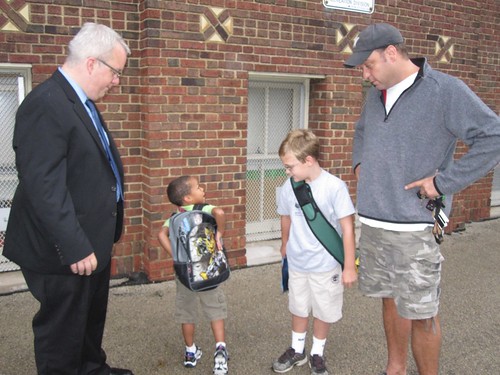After a lengthy lost weekend in Las Vegas, I put my kids to bed last night by singing the entirity of Gordon Lightfoot's unlikely AM radio hit, "The Wreck of The Edmund Fitzgerald." Rapt attention through the entirity, so they either liked the melody (doubtful, since I'm near tone-deaf) or they have an interest in Lake Superior shipwrecks of the early 1970's. With the help of Dan Fox and Dick Weissman's Great Family Songbook, I also sing "Jesse James" (which Caleb calls "the train song," due to the book's illustration of a James gang member attempting to rob the Glendale tain) and "All the Pretty Horses," which ends with a description of birds and butterflies picking at a lamb's eyes. Someone should start a parents group to protect our children from the coarse pop culture of the 19th century.
This summer, I discovered the Milwaukee Public Library's County Catalog request system. I plug in a book title, hit a button, and the book shows up at my local branch, typically within a week. This has surely had a negative financial impact on my local bookstore, but it's done a wonder for our tightened entertainment budget. When it comes down to highways and libraries, who doesn't love them a little socialism?
 Benjamin Hedin, Ed. -- Studio A: The Bob Dylan Reader. This is kind of a clip file on Dylan, containing important articles, reviews, criticism, and other things from the 1960's on. Highlights include: Greil Marcus' 1970 Rolling Stone review of the de-mythologizing "Self-Portrait" -- the review begins with the line "What is this shit?"; an Alex Ross New Yorker article from the late 90's; a Sean Wilentz essay that makes one eager to read his book, Bob Dylan in America, which appears in bookstores this week. And then there's a surprising amount of bad poetry written about or in response to Bob Dylan. So I learned this: reading poetry about music makes you miss guitars.
Benjamin Hedin, Ed. -- Studio A: The Bob Dylan Reader. This is kind of a clip file on Dylan, containing important articles, reviews, criticism, and other things from the 1960's on. Highlights include: Greil Marcus' 1970 Rolling Stone review of the de-mythologizing "Self-Portrait" -- the review begins with the line "What is this shit?"; an Alex Ross New Yorker article from the late 90's; a Sean Wilentz essay that makes one eager to read his book, Bob Dylan in America, which appears in bookstores this week. And then there's a surprising amount of bad poetry written about or in response to Bob Dylan. So I learned this: reading poetry about music makes you miss guitars. Tom Bissell -- Extra Lives: Why Video Games Matter. Bissell, a young and well-published MSU grad, has previously written books of travel, war, and fiction but here attempts to attach a lit-crit approach to video games. It almost works, but a much of the supposed lit-crit comes down to describing what is cool, or not cool, about certain recent video games. I haven't played many of the games Bissell mentions, and while he's particularly good at explaining what is good or innovative or interesting about recent video games, there's relatively little attention paid to why these games "matter." And the lit-crit approach never quite crosses over into analysis. It was interesting to learn terms like "ludonarrative dissonance," but I expected more, somewhat. A good game strikes me as operating similarly to a good story (in that we want to finish as fast as we can and yet never want the experience to end), so I wanted and expected a lot more lit-crit grad-school post-this or -that stuff than I actually got. The final chapter in Bissell's book, in which he discusses a long binge on Grand Theft Auto IV and cocaine in Las Vegas struck me as a great opportunity to discuss the addictiveness of games (and narrative, perhaps). A good book is one we can't put down, a good game is one we can't stop playing, and maybe a good drug is one we can't stop taking. I guess we are programmed to desire.
Tom Bissell -- Extra Lives: Why Video Games Matter. Bissell, a young and well-published MSU grad, has previously written books of travel, war, and fiction but here attempts to attach a lit-crit approach to video games. It almost works, but a much of the supposed lit-crit comes down to describing what is cool, or not cool, about certain recent video games. I haven't played many of the games Bissell mentions, and while he's particularly good at explaining what is good or innovative or interesting about recent video games, there's relatively little attention paid to why these games "matter." And the lit-crit approach never quite crosses over into analysis. It was interesting to learn terms like "ludonarrative dissonance," but I expected more, somewhat. A good game strikes me as operating similarly to a good story (in that we want to finish as fast as we can and yet never want the experience to end), so I wanted and expected a lot more lit-crit grad-school post-this or -that stuff than I actually got. The final chapter in Bissell's book, in which he discusses a long binge on Grand Theft Auto IV and cocaine in Las Vegas struck me as a great opportunity to discuss the addictiveness of games (and narrative, perhaps). A good book is one we can't put down, a good game is one we can't stop playing, and maybe a good drug is one we can't stop taking. I guess we are programmed to desire. David Maine -- The Book of Samson. This is the third Old Testament novel that Maine has written, and the latest to be touched on here. Maine's approach seems a bit formulaic, after The Preservationist and Fallen, so I guess it's a good thing that his latest novel is one that breaks away from biblical themes to 1950's monster movies. It fleshes out the story of Samson, just in a not-quite-as-captivating way as he did Noah or Cain. There is a nice technique of foregoing intra-sentence punctuation as a way to de-familiarize Samson's usage and allow him to be observant and articulate while still communicating the character's relative dimness and niavete. Unfortunately, the drama is somewhat affected by the pre-ordained ending. Spoiler: he gets a haircut.
David Maine -- The Book of Samson. This is the third Old Testament novel that Maine has written, and the latest to be touched on here. Maine's approach seems a bit formulaic, after The Preservationist and Fallen, so I guess it's a good thing that his latest novel is one that breaks away from biblical themes to 1950's monster movies. It fleshes out the story of Samson, just in a not-quite-as-captivating way as he did Noah or Cain. There is a nice technique of foregoing intra-sentence punctuation as a way to de-familiarize Samson's usage and allow him to be observant and articulate while still communicating the character's relative dimness and niavete. Unfortunately, the drama is somewhat affected by the pre-ordained ending. Spoiler: he gets a haircut. Max Brooks -- World War Z. I probably won't be able to effectively communicate how great this book is unless I withold some information about it to the end of this paragraph. This is a fictional oral history of a "hot zone"-style bio-viral outbreak, focusing on the global response to combat it. There are lessons to be learned here about the limitations and strategic weaknesses of military and political responses, and a suggestion that only coordinated containment strategies and supply-reinforced safe zones will ultimately have any effectiveness against such outbreaks. Okay, so the "outbreak" here involves zombies, but this book is more closely related to works of modern military history than it is to the horror genre. There's no attempt to go for the scare, shock, or Kingian gross-out. Instead, you'll learn solid tactics for fighting brainless and hungry hordes of undead. Here's a tip: keep that ceremonial sword handy.
Max Brooks -- World War Z. I probably won't be able to effectively communicate how great this book is unless I withold some information about it to the end of this paragraph. This is a fictional oral history of a "hot zone"-style bio-viral outbreak, focusing on the global response to combat it. There are lessons to be learned here about the limitations and strategic weaknesses of military and political responses, and a suggestion that only coordinated containment strategies and supply-reinforced safe zones will ultimately have any effectiveness against such outbreaks. Okay, so the "outbreak" here involves zombies, but this book is more closely related to works of modern military history than it is to the horror genre. There's no attempt to go for the scare, shock, or Kingian gross-out. Instead, you'll learn solid tactics for fighting brainless and hungry hordes of undead. Here's a tip: keep that ceremonial sword handy.
Josh Frank and Caryn Ganz -- Fool The World: An Oral History of a Band Called Pixies. My kids were using the computers at the East Side branch of the library, and I discovered this pocket of shelves devoted to musician biographies. I debated a bit between the oral history of the Pixies and the oral history of the Replacements, and ultimately went with the Pixies, since I had all their records but knew less about them. Unfortunately, I still don't know much about them. There's a lot here from recording studio folks or hangers-on, and some stuff from the band members themselves, but not much on where the music came from or what is unique about the Pixies songwriting, as if the way the authors solved the "dancing about architecture" problem was to disregard the music entirely. Also, they have this weird insistence that the band was "Pixies" not "the Pixies," which they adhere to with weird fervor. Note, for example, the strangely formalized subtitle they have to resort to in order to avoid "An Oral History of Pixies." What's so funny about definite articles? In short, the Pixies seem so from out of space and from out of nowhere that I would have liked more on the songs -- their lyrics, meaning, creation. Ultimately, one realizes that the artistic creation is ultimately invisible and unknowable -- this is also why novels about bands are always awful. That, and the architecture-dancing. Do, however, watch loudQUIETloud.




